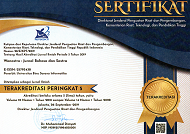Human Values of Main Character in Chappie Movie Directed by Neill Blomkamp
Abstract
This research is presenting about human values as an element of fiction that applied in a movie entitled Chappie. The analysis is focus on finding how human values of main character that appear in the movie and the human values influence to the characterization of main character in Chappie movie. The methods of this research are descriptive qualitative method and library research to get the data. The data of this analysis are taken from Chappie movie directed by Neill Blomkamp. Furthermore, the researcher takes some theories from several books that related with the title to analyze human value of the main character in Chappie movie. The researcher is also identifies data and information from the theories. Hereafter, the researcher analyse the data to finds the problem to discuss deeply. The researcher uses basic human values theory by Shalom H. Schwartz. The result of this analysis are human values appear of main character when Chappie has self-direction, tradition, stimulation, achievement, and universalism in his behaviour. Human values influence the characterization of main character when he takes attention, perception, interpretation in situations, and the planning of action in his life.
Keywords: human value; main character; movie
Full Text:
PDFReferences
REFERENCE
Boggs, Joseph M., and Dennis W Petrie. The art of watching films. New York. 2008.
Bernays, Anne, and Pamela Painter. What If? Writing Exercises for Fiction Writers. 2015.
Bacon, Francis. The Advancement of Learning. US: The Project Gutenberg. 2014.
Barsam, Richard Meran, and Dave Monahan. Looking at movies : an introduction to fi¬lm 3rd edition. New York: W. W. Norton & Company, Inc. 2010.
Cavanagh, Dermot, et al. The Edinburgh Introduction to Studying English Literature. Edinburgh: Edinburgh University Press Ltd. 2010.
Dowst, Robert Saunders. The Technique of Fiction Writing. US: The Project Gutenberg. 2010.
Dunne, Will. The dramatic writer’s companion: tools to develop characters, cause scenes, and build stories. Chicago: The University of Chicago Press. 2009.
Debbarma, Mohan. Importance of Human Values in the Society. Volume II Issue I, April 2014.
Eisaesser, Thomas, and Malte Hagener. Film Theory: An introduction through the senses. New York: Routledge. 2010.
Field, Syd. Screenplay : the foundations of screenwriting. New York. Bantam Dell. 2005.
Fry, Paul H. Theory of literature. Connecticut: Yale University. 2012.
Huntley, Chris. A Comparison of Seven Story Paradigms. California: Write Brothers®Inc. 2007.
Hilrich, O. Human basics: Philosophy of Most Basic Knowledge. 2014.
Robbins, Stephen P., and Timothy A. Judge. Organizational behaviour 15th ed. New Jersey: Pearson Education, Inc. 2013.
Selden, Raman, et al. A Reader’s Guide to Contemporary Literary Theory 5th edition. Harlow: Pearson Education Limited. 2005.
Schwartz, Shalom H. A Theory of Cultural Value Orientations: Explication and Applications. 2006.
Schwartz, Shalom H. An Overview of the Schwartz Theory of Basic Values. 2012.
Wellek, Rene, and Austin Warren. Teori Kesusasteraan. Jakarta: PT. Gramedia Pustaka Utama. 2014.
DOI: https://doi.org/10.31294/w.v9i1.1551
Copyright (c) 2017 Cicih Nuraeni

This work is licensed under a Creative Commons Attribution-ShareAlike 4.0 International License.
Index by:
Published by Department of Research and Community Service (LPPM) Universitas Bina Sarana Informatika by supported Relawan Jurnal Indonesia
Jl. Kramat Raya No.98, Kwitang, Kec. Senen, Jakarta Pusat, DKI Jakarta 10450

This work is licensed under a Creative Commons Attribution-ShareAlike 4.0 International License






